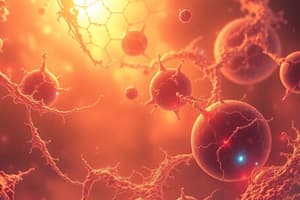Podcast
Questions and Answers
What is the primary function of the collimator in the thyroid probe?
What is the primary function of the collimator in the thyroid probe?
- To measure the distance between the detector and the thyroid
- To reduce the background activity from external sources (correct)
- To amplify the signal from the detector
- To increase the field of view on the thyroid
What is the energy of the gamma ray used for calibrating the thyroid probe?
What is the energy of the gamma ray used for calibrating the thyroid probe?
- 662-keV gamma ray of 131I
- 364-keV gamma ray of 131I
- 364-keV gamma ray of 137Cs
- 662-keV gamma ray of 137Cs (correct)
What is the relationship between the efficiency of a thyroid probe and the distance between the detector and the thyroid?
What is the relationship between the efficiency of a thyroid probe and the distance between the detector and the thyroid?
- The efficiency increases with the square of the distance
- The efficiency decreases with the square of the distance (correct)
- The efficiency is inversely proportional to the distance
- The efficiency is directly proportional to the distance
What is the purpose of the discriminator settings in the thyroid probe system?
What is the purpose of the discriminator settings in the thyroid probe system?
What is the advantage of using a thyroid probe for in vivo measurements?
What is the advantage of using a thyroid probe for in vivo measurements?
What is the primary difference between a thyroid probe and a well counter?
What is the primary difference between a thyroid probe and a well counter?
What is the purpose of the NaI(Tl) detector in the thyroid probe system?
What is the purpose of the NaI(Tl) detector in the thyroid probe system?
What is the effect of attenuation on the recorded counting rate in the thyroid probe system?
What is the effect of attenuation on the recorded counting rate in the thyroid probe system?
What is the purpose of the single channel analyzer (SCA) in the thyroid probe system?
What is the purpose of the single channel analyzer (SCA) in the thyroid probe system?
What is the advantage of using a mobile stand for the thyroid probe system?
What is the advantage of using a mobile stand for the thyroid probe system?
Flashcards are hidden until you start studying
Study Notes
Radioactive Tracers
- Examples of radioactive tracers include technetium-99, thallium-201, iodine-131, and sodium-24.
- These tracers can be used to target specific organs, such as the heart, liver, and lungs, for diagnostic and therapeutic purposes.
Isotope Therapy
- Attached radionuclides can be delivered to a targeted location, allowing for localized therapeutic radiation with minimal impact on surrounding organs.
Static and Dynamic Examinations
- In nuclear medicine, examinations can be classified into two types: static and dynamic.
- Static examinations involve the accumulation of radiotracers in normal tissues, pathologic lesions, or distribution spaces, resulting in a single image or "snapshot" of the radiopharmaceutical distribution.
Static Imaging
- Examples of static images include lung scans, spot bone scan images, and thyroid images.
Dynamic Examinations
- Dynamic examinations can produce images of spatial activity and follow the course of certain processes or flow over time, such as renal filtration and myocardial blood flow.
- Dynamic examinations can be used to follow urine excretion in the kidney, for instance.
Photon Attenuation and Scattering
- Attenuation of photons in thyroid tissues reduces the overall detection efficiency of the probe.
- Scattered photons in the thyroid gland may interact with the detector, but can be excluded by selecting appropriate discriminator settings.
Calibrating Thyroid Uptake Probe
- The depth of the source distribution within the patient is often unknown, which can result in a 10% to 40% difference in recorded counting rate.
- Measurements are typically made with the SCA window set on the photopeak of the γ-ray emission to be counted, to minimize the contribution from scattered radiation.
Miniature γ-Ray Probes
- Miniature γ-ray probes are designed for surgical use, particularly for detecting sentinel lymph nodes in patients with breast cancer and melanoma.
- These probes are compact and have a collimator that limits the field of view, reducing background activity from outside the thyroid.
NaI(Tl) Probe System
- The NaI(Tl) probe system consists of a collimated detector mounted on a stand, which can be oriented and positioned over an area of interest on the patient.
- The detector is connected to electronics, including a single-channel analyzer (SCA) and a digital counter or computer, used for diagnostic tests for thyroid disease.
Studying That Suits You
Use AI to generate personalized quizzes and flashcards to suit your learning preferences.




